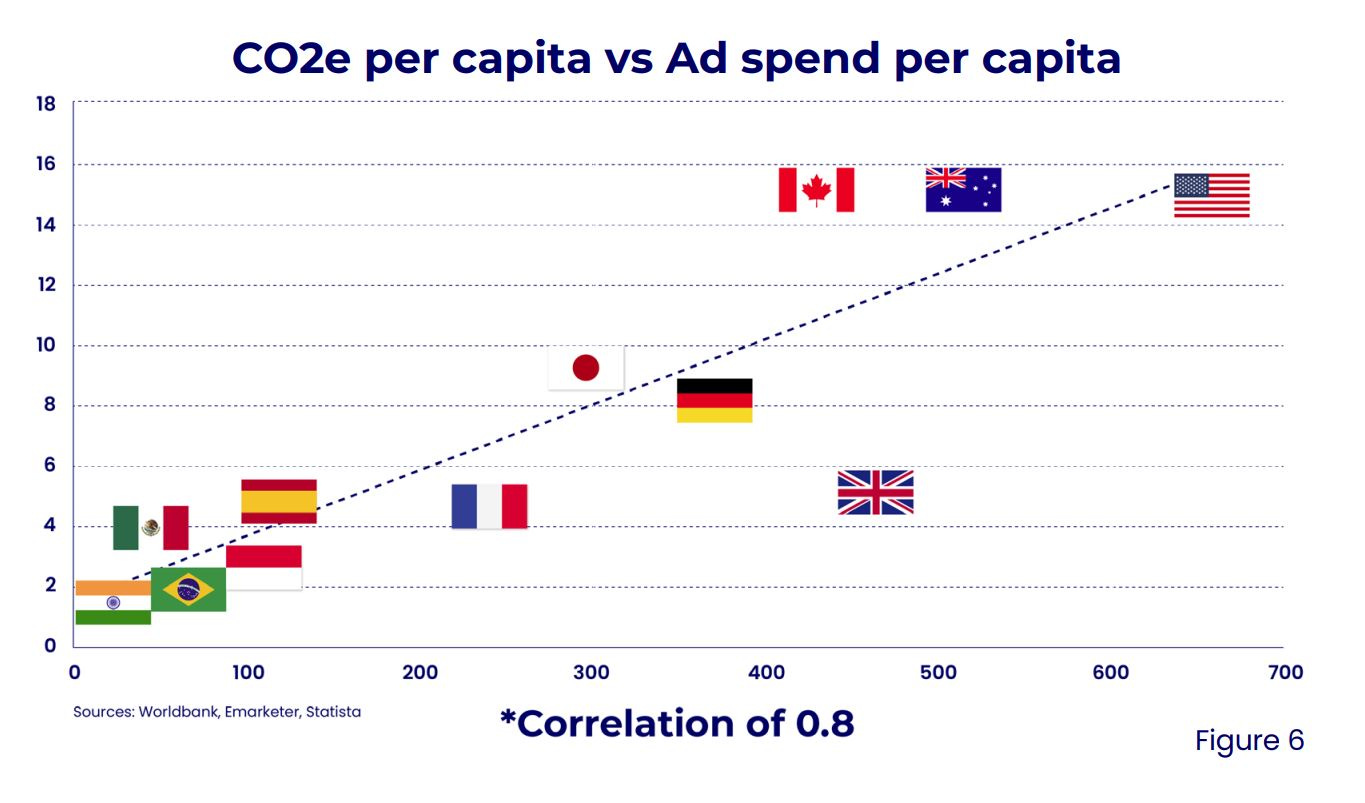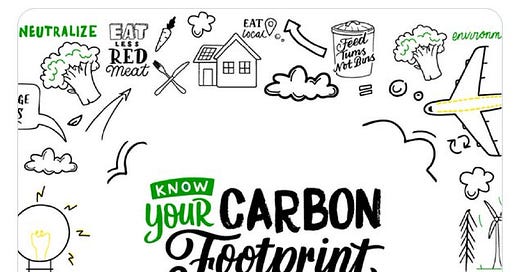

Discover more from Oxymoron
The UK government has just introduced a ban on advertising. While the public are enjoying less cluttered streets and greater mental clarity, the ad executives are protesting by blockading Soho Square with their Porsche’s. Nobody seems particularly bothered.
Of course I’m joking. This has not happened, but it’s interesting to wonder what the world would be like if advertising was banned. This idea was suggested in workshop that I attended at GoodFest recently and I was intrigued to see that the response was overwhelmingly positive.
Advertising is one of those strange things that we take for granted and yet on some level, we despise it. Yes, there's the occasional Christmas advert or movie trailer that we actually enjoy, or an advert that becomes a part of our shared culture, because it’s cool for cats. But these are the rare exceptions not the rule, and even then it’s questionable whether they are actually good for us.

TV adverts, billboards, Google Ads, social ads, website banner ads, marketing emails, bus adverts, taxi adverts, direct mail, the trailers at the cinema, printed ads in newspapers and magazines. The list goes on. We can't escape advertising.
So this week I am wondering, what would the world be like without advertising? What would be the good, the bad and the confusing?
The good
The immediate benefit from a total advertising ban would arguably be to people’s wellbeing. In a world where nobody was being manipulated to desire what they don’t have or to feel that buying more things will make them happy, people might be more happy and content with their lives. They would also be less distracted and have more mental clarity and focus as a result of no longer being targeted by companies trying to capture (and sell) their attention. In fact, the entire attention economy would evaporate, leading to the disappearance of services, especially digital services, that are designed to be addictive. This could have potentially huge benefits not just in giving people back their own time, but also improving mental health.
Maybe people would also be financially better off because they would buy less things that they don’t need, although other economic factors might outweigh this. The reduction in consumption would definitely have an environmental benefit though. The purpose of the advertising industry is to drive consumption of goods and services. With the global advertising industry being worth approximately $800 billion1 annually, it presumably is helping businesses sell goods worth even more than that. Purpose Disruptors have been studying the impact of advertising on climate change and their latest report for 2022 attributed 32% of each UK citizens carbon footprint to the advertising industry. If that’s true, it would mean that a ban on advertising could slash emissions by a third. That’s massive!
So far so good. Now let’s look at the downsides.

The bad
With the global advertising industry worth around $800 billion and the value of goods sold as a result of advertising being greater than that, some back of an envelope maths tells me that the theoretical loss of economic value to a global ban on advertising could be around $2 trillion. That’s around 2% of the global economy.
While the direct benefits to people’s wellbeing and the environment might be significant, the economic fallout would also be enormous, with everyone who works in advertising losing their jobs. Many companies that rely on advertising to sell products such as fashion brands and car manufacturers would also shrink significantly, if they survived at all. And then there are the companies that make their money from selling ad space, including commercial TV channels, newspapers, magazines and of course, the big tech companies like Google and Meta. How would they survive without advertising revenue?
So the big downside to a ban on advertising would most likely be a major economic shock resulting in mass job losses, not just for advertising executives but for a wide range of people in all industries. At least that’s my assumption. It's often joked that 50% of advertising is a waste of money, but nobody knows which half. What if the economy isn’t as dependent on advertising as we have been made to believe. What if the advertising industry is just very good at advertising itself?
There is a more important point here though, which is that the main reason not to ban advertising is not that we actually need advertising, not that advertising makes society better, but that we have created an economic dependency on the consumption that it promotes. We have become addicted not just to consumption, but to the advertising industry itself. We can’t quit without going through the suffering of potentially dire withdrawal symptoms.
The confusing
A thought experiment like this raises as many questions as it answers. Let’s take a look at just a few.
There are many business that survive and even thrive without advertising. My own business, Wholegrain Digital has grown over the past 15 years by doing good work and generating demand by word of mouth, the most valuable form of promotion in existence. At the other end of the size spectrum, Tesla has given legacy carmakers a run for their money without doing any ‘advertising’, because they have captured people’s imaginations and offered them something better. In both cases, the limiting factor on the size of the businesses has not been demand, but production capacity. I would argue that companies that offer people what they really want will always be in demand and conversely, any industry or business that’s dependent on advertising should probably ask itself some tough questions. I wonder, would a ban on advertising go some way to answering a question I asked in an earlier post, Which businesses are actually necessary? I think it might.
A ban on advertising would also require us to define exactly what we mean by advertising. While some forms of advertising seem fairly clear cut, other forms of marketing such as product placement in movies, affiliate links on the internet, PR and celebrity endorsement are arguably a bit of a grey area. As someone who runs a web design agency, I am a little scared to ask where websites would fit into this scenario! Even if websites were allowed, how would anyone find them if Google had gone bankrupt?
Another thing to consider is that advertising can also be used to promote things that are good for the world, such as charitable fundraising. Would a ban on advertising starve these positive organisations of much needed funds, or would they no longer need paid advertising as their messages would not be crowded out by companies desperate to buy our attention? I imagine the reality would probably be somewhere in the middle, but how can we know?
Should we ban advertising?
While a ban on advertising might seem like a radical and perhaps dangerous idea, I think it raises some important questions about the impact of the advertising sector on the health of our planet, our personal wellbeing and the hold that it has on the economy. Perhaps we would be better off without it, but perhaps the economic costs of weaning ourselves off the drugs would be too great.
But there is a precedent. The UK government banned most forms of tobacco advertising in 2002. It proves that government’s are able to ban advertising when it is in the public interest. We take advertising for granted, but maybe we shouldn’t. Maybe we should be exploring this question more seriously as we attempt to transition to a socially and environmentally sustainable economy.
To wrap up, I just want to say a big thanks for subscribing and sharing. I don’t advertise this newsletter (unless you count sharing it on LinkedIn), and am grateful to have so many of you reading and engaging so enthusiastically with my ongoing exploration into the complex and confusing world of sustainable business.















The amount of mental real estate taken up by advertising (if it could be measured in terms of square feet) must be on a much larger scale than that seen in the real world. I still remember chewing gum jingles from 30 years ago!
In real-world terms though, there's an interesting example of what a ban on advertising in public spaces could be like. The 'Clean City Law' that was passed in São Paulo is described pretty succinctly in this article by the always fantastic 99% invisible:
https://99percentinvisible.org/article/clean-city-law-secrets-sao-paulo-uncovered-outdoor-advertising-ban/
This is amazing! Thank you so much for sharing this Glyn!